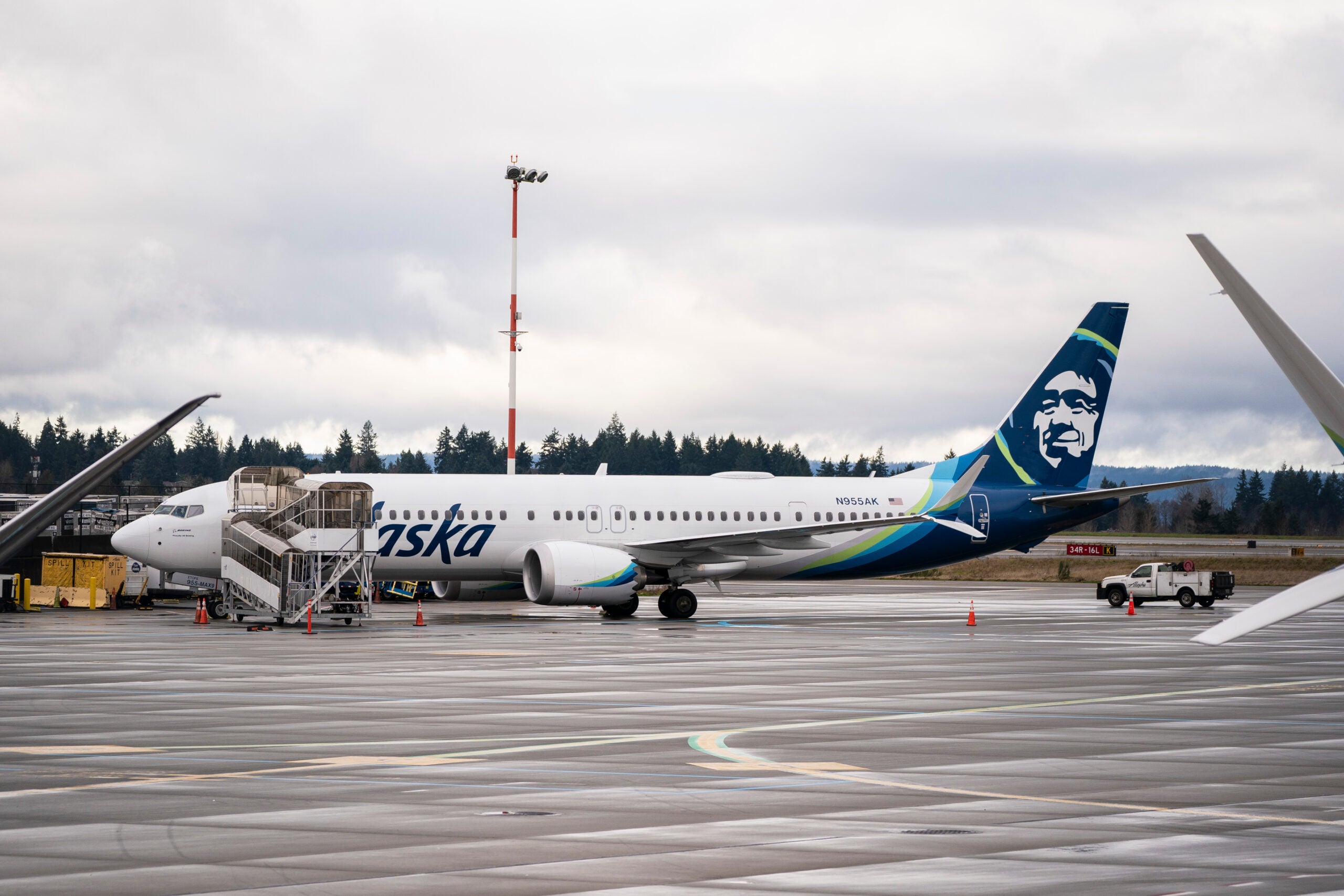
[ad_1]
Flight cancellations continue to mount in the wake of Friday’s emergency on board an Alaska Airlines jet, which saw passengers exposed to the elements more than 16,000 feet above the ground after an emergency exit-size door plug separated from the fuselage, causing rapid decompression on board.
Airlines have canceled hundreds of flights in recent days after the Federal Aviation Administration grounded Boeing 737 MAX 9 planes like the aircraft involved in Friday’s incident.
Alaska and United Airlines, the two U.S. carriers that fly the MAX 9, canceled a collective 388 flights by late afternoon Monday, according to data from FlightAware. That’s after the two airlines canceled a total of 713 flights Saturday and Sunday.
As the National Transportation Safety Board works to pinpoint the exact cause of Friday’s incident, it’s still not clear when the disruptions might end.
Which airlines fly the 737 MAX 9?
Two U.S. airlines and several international carriers that fly to the U.S. currently have Boeing 737 MAX 9 aircraft in their fleets.
United leads the way: The Chicago-based carrier has 79 Boeing 737 MAX 9s in service. Prior to this weekend, United had 7,951 flights with the MAX 9 scheduled for this month, according to aviation analytics firm Cirium.
Alaska, which has 65 Boeing 737 MAX 9s in service (and 25 on order), had more than 5,000 MAX 9 flights planned for this month.
Mexican flag carrier Aeromexico and Panama-based Copa Airlines also fly the jet.
Globally, there are currently 215 MAX 9s in service, Cirium reports.

Daily Newsletter
Reward your inbox with the TPG Daily newsletter
Join over 700,000 readers for breaking news, in-depth guides and exclusive deals from TPG’s experts
Operational impact from MAX 9 grounding
With the FAA this weekend ordering inspections of all the Boeing 737 MAX 9s in service, airlines have had to ground the aircraft, triggering disruptions to flight schedules across the country.
“Just like with anything else that happens, it’s going to have a snowball effect through the system,” said Shem Malmquist, a longtime captain, flight safety and accident investigations expert. (Malmquist also currently serves as an instructor at Florida Institute of Technology’s College of Aeronautics.)
“You can’t just pull that many airplanes out of your fleet and not expect things to happen,” Malmquist told TPG.
Seattle-Tacoma International Airport (SEA), Alaska’s home base, and Newark Liberty International Airport (EWR), a major United hub, have been among the most affected airports, FlightAware data shows.
Alaska warned this weekend that “significant cancellations” would be likely through the first half of this week. The airline’s 154 cancellations Monday amounted to a fifth of Alaska’s operation after disruptions Sunday affected roughly 25,000 passengers.
For its part, United reports it has parked each of its Boeing 737 MAX 9 aircraft and has been working to accommodate affected customers on other flights while, in some cases, avoiding cancellations by swapping out different aircraft types when possible.
“We’re continuing to work with the FAA to clarify the inspection process and requirements for returning all MAX 9 aircraft to service,” a United spokesperson told TPG in a statement.
In a key development, the FAA said Monday afternoon it had approved a method for airlines to comply with its airworthiness directive for the MAX 9, meaning, essentially, that it told airlines what they need to do to inspect and return aircraft to service.
The NTSB recovered the door plug on a property in Oregon on Sunday. It should prove to be a critical piece of the investigation and, ultimately, help determine what it will take to return the aircraft to service.
United told TPG it had already begun preliminary inspections while awaiting instructions from the FAA. The airline later said that it had found several instances of installation defects on door plugs during the inspections.
Meanwhile, affected Aeromexico flights in recent days included a handful of routes between its Mexico City home base and the U.S. — including cancellations to Las Vegas, Orlando and Miami routes on Sunday.
A Copa flight between Panama City and Dulles International Airport (IAD) outside Washington, D.C., was canceled Sunday, too, FlightAware shows.
How long will the 737 MAX 9 stay grounded?
How long might the flight disruptions last? It depends on how long the MAX 9 stays grounded, which itself depends on what the investigation reveals about the precise problem that caused Friday’s emergency and the nature of the inspection airlines must perform, Malmquist said.
“The best case is that this was a one-off … if that’s the case, it could be pretty short,” Malmquist said. “The worst case is that they discover that it’s actually something fundamental to the design of the plug itself.”
It’s not yet clear how United’s discovery of installation defects might affect the plane’s return-to-service timeline.
Interior of the Alaska 737 MAX 9 jet photographed by investigators. NATIONAL TRANSPORTATION SAFETY BOARD
As the investigations unfold, it’s worth keeping a close eye on your airline’s app if you have a booking for the coming days — primarily aboard United or Alaska — in the event your flight is canceled. Affected passengers could also see their reservations changed, including being rebooked to another itinerary. If you’re flying on Alaska, it’s possible you could get rebooked on its key domestic partner, American Airlines.
As always, if your flight is canceled or significantly delayed, or the schedule drastically changes — and you choose not to fly — you’re entitled to a refund under U.S. Department of Transportation policies.
Related reading:
[ad_2]





